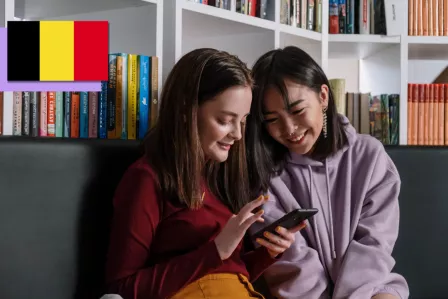Employees across Belgium cleared their schedules to teach 5th and 6th grade students some reflexes about online safety - in particular about privacy, cyberbullying, sexting and online friendships.

On Thursday 10 October, Child Focus, partners and elementary school across Belgium joined forces to conduct 200 Internet Safe & Fun workshops. Employees of a dozen companies cleared their schedules to teach 5th and 6th grade students some basic reflexes about online safety and in particular about privacy, cyberbullying, sexting and online friendships. Child Focus has seen the number of reports of problems linked to online safety rise in recent years. Thanks to the Internet Safe & Fun programme, hundreds of schools are receiving support for their students' media literacy.
In the interactive Internet Safe & Fun workshops, children ages 10 to 12 learn the proper reflexes for fun, safe, aware and critical internet use. The volunteer animators are trained by Child Focus beforehand. During the workshops, together with the young Internet users, they look at their online activities from a positive perspective while making them aware of the risks they sometimes take on social media platforms. This day of action takes place twice a year. Annually, Child Focus reaches around 10 000 students in this way.
Responding to change through an ever-evolving workshop
The animators discuss four concrete situations straight from the children's world. The situations are linked to platforms the children use to make it as relatable to them as possible. For example, they discuss the importance of privacy, and raise awareness on sexting, cyberbullying and contacting strangers on specific platforms.
“We are adapting the workshop and methodology based on the changes in internet use and our children's lives. The themes remain, but the platforms and children are constantly evolving. In this workshop, difficult topics are addressed in a playful way and we engage in dialogue with the children through videos and interactive games.” Nel Broothaerts, CEO of Child Focus.
Find more information about the work of the Belgian Safer Internet Centre, including its awareness raising, helpline, hotline, and youth participation services, or find similar information for other Safer Internet Centres throughout Europe.
Employees across Belgium cleared their schedules to teach 5th and 6th grade students some reflexes about online safety - in particular about privacy, cyberbullying, sexting and online friendships.

On Thursday 10 October, Child Focus, partners and elementary school across Belgium joined forces to conduct 200 Internet Safe & Fun workshops. Employees of a dozen companies cleared their schedules to teach 5th and 6th grade students some basic reflexes about online safety and in particular about privacy, cyberbullying, sexting and online friendships. Child Focus has seen the number of reports of problems linked to online safety rise in recent years. Thanks to the Internet Safe & Fun programme, hundreds of schools are receiving support for their students' media literacy.
In the interactive Internet Safe & Fun workshops, children ages 10 to 12 learn the proper reflexes for fun, safe, aware and critical internet use. The volunteer animators are trained by Child Focus beforehand. During the workshops, together with the young Internet users, they look at their online activities from a positive perspective while making them aware of the risks they sometimes take on social media platforms. This day of action takes place twice a year. Annually, Child Focus reaches around 10 000 students in this way.
Responding to change through an ever-evolving workshop
The animators discuss four concrete situations straight from the children's world. The situations are linked to platforms the children use to make it as relatable to them as possible. For example, they discuss the importance of privacy, and raise awareness on sexting, cyberbullying and contacting strangers on specific platforms.
“We are adapting the workshop and methodology based on the changes in internet use and our children's lives. The themes remain, but the platforms and children are constantly evolving. In this workshop, difficult topics are addressed in a playful way and we engage in dialogue with the children through videos and interactive games.” Nel Broothaerts, CEO of Child Focus.
Find more information about the work of the Belgian Safer Internet Centre, including its awareness raising, helpline, hotline, and youth participation services, or find similar information for other Safer Internet Centres throughout Europe.
- internet for young people media literacy online safety youth empowerment
Related content
- < Previous article
- Next article >












